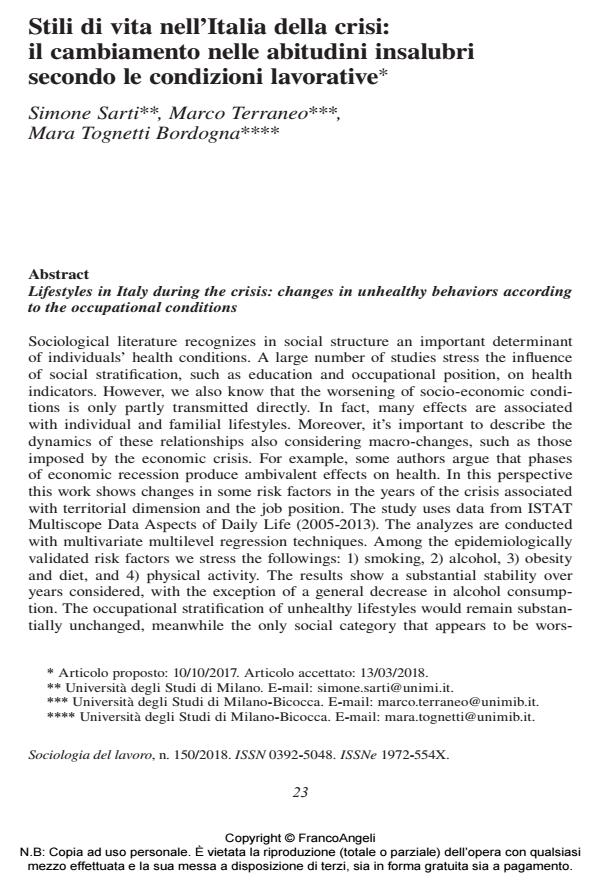Lifestyles in Italy during the crisis: changes in unhealthy behaviors according to the occupational conditions
Journal title SOCIOLOGIA DEL LAVORO
Author/s Simone Sarti, Marco Terraneo, Mara Tognetti Bordogna
Publishing Year 2018 Issue 2018/150
Language Italian Pages 26 P. 23-48 File size 257 KB
DOI 10.3280/SL2018-150002
DOI is like a bar code for intellectual property: to have more infomation
click here
Below, you can see the article first page
If you want to buy this article in PDF format, you can do it, following the instructions to buy download credits

FrancoAngeli is member of Publishers International Linking Association, Inc (PILA), a not-for-profit association which run the CrossRef service enabling links to and from online scholarly content.
Sociological literature recognizes in social structure an important determinant of individuals’ health conditions. A large number of studies stress the influence of social stratification, such as education and occupational position, on health indicators. However, we also know that the worsening of socio-economic conditions is only partly transmitted directly. In fact, many effects are associated with individual and familial lifestyles. Moreover, it’s important to describe the dynamics of these relationships also considering macro-changes, such as those imposed by the economic crisis. For example, some authors argue that phases of economic recession produce ambivalent effects on health. In this perspective this work shows changes in some risk factors in the years of the crisis associated with territorial dimension and the job position. The study uses data from ISTAT Multiscope Data Aspects of Daily Life (2005-2013). The analyzes are conducted with multivariate multilevel regression techniques. Among the epidemiologically validated risk factors we stress the followings: 1) smoking, 2) alcohol, 3) obesity and diet, and 4) physical activity. The results show a substantial stability over years considered, with the exception of a general decrease in alcohol consumption. The occupational stratification of unhealthy lifestyles would remain substantially unchanged, meanwhile the only social category that appears to be wors-ening (in particular smoking and physical activity) is composed of unemployed persons in southern Italy, an area strongly impacted by the crisis.
Keywords: Lifestyles, health inequalities, economic crisis, social class, occupational groups
- The 2008 Financial Crisis and Changes in Lifestyle-Related Behaviors in Italy, Greece, Spain, and Portugal: A Systematic Review Monica Sane Schepisi, Anteo Di Napoli, Rosario Asciutto, Simona Vecchi, Concetta Mirisola, Alessio Petrelli, in International Journal of Environmental Research and Public Health /2021 pp.8734
DOI: 10.3390/ijerph18168734
Simone Sarti, Marco Terraneo, Mara Tognetti Bordogna, Stili di vita nell’Italia della crisi: il cambiamento nelle abitudini insalubri secondo le condizioni lavorative in "SOCIOLOGIA DEL LAVORO " 150/2018, pp 23-48, DOI: 10.3280/SL2018-150002